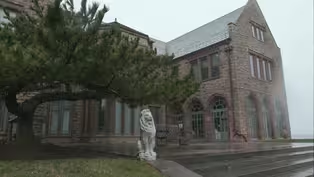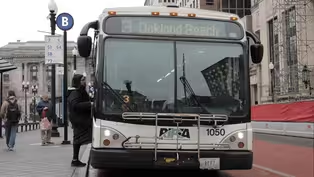
Joyful Rebellion
Clip: Season 5 Episode 16 | 9m 15sVideo has Closed Captions
Educator Roberto Gonzalez says passion and ownership are key to learning.
Rhode Island educator Roberto Gonzalez says giving students ownership over the projects they do helps ensure they learn the material. Gonzalez is the founder of STEAM Box, a non-profit that develops science and technology-based programming. But Gonzalez’s lessons go beyond academics. He’s also on a mission to spark what he calls a “Joyful Rebellion” and help students improve their mental health.
Problems playing video? | Closed Captioning Feedback
Problems playing video? | Closed Captioning Feedback
Rhode Island PBS Weekly is a local public television program presented by Ocean State Media

Joyful Rebellion
Clip: Season 5 Episode 16 | 9m 15sVideo has Closed Captions
Rhode Island educator Roberto Gonzalez says giving students ownership over the projects they do helps ensure they learn the material. Gonzalez is the founder of STEAM Box, a non-profit that develops science and technology-based programming. But Gonzalez’s lessons go beyond academics. He’s also on a mission to spark what he calls a “Joyful Rebellion” and help students improve their mental health.
Problems playing video? | Closed Captioning Feedback
How to Watch Rhode Island PBS Weekly
Rhode Island PBS Weekly is available to stream on pbs.org and the free PBS App, available on iPhone, Apple TV, Android TV, Android smartphones, Amazon Fire TV, Amazon Fire Tablet, Roku, Samsung Smart TV, and Vizio.
Providing Support for PBS.org
Learn Moreabout PBS online sponsorshipre's one.
- [Michelle] Roberto Gonzalez wants to help students explore subjects they're passionate about.
- Battery, battery, battery.
- Battery.
- [Michelle] For many of his students, that passion coincides with one of his: science.
- [Roberto] Everybody see I got the wire in here?
- Yeah.
- I'm gonna give it a little twist.
- [Michelle] These students gathered at the Central Falls High School library are learning how to make a small robot out of a toothbrush.
- A really simple project where we're using a power source, we're using a motor, we're using the toothbrushes, and then they get to customize them.
- [Michelle] The group meets once a week after school to work on these projects.
They don't have to attend, but they want to.
(students laughing) - Wednesdays we do engineering days, so we're, like, learning how to make circuits, we're learning how to make robots, doing AI and coding.
- I love hands-on stuff.
I could never be a kid that could sit, like, sit still or stand still, so it's like working with my hands and being able to do stuff, I find it interesting for myself.
- We've learned a little bit of wiring.
If we wanted the wires to really stay together, we might get into soldering.
What's soldering?
- [Michelle] In 2013, Gonzalez was working as the technology center director at a local youth organization when he decided he wanted to do something to address the gender gap in the STEM fields, science, technology, engineering, and math.
- There was a large gap between girls who were leaving programs with science degrees, but the jobs, the incoming jobs, were going to boys.
Over 50% of the girls were getting the degrees and less than 30% of the girls were getting the jobs.
Do you think the bananas conduct electricity?
- [Students] Yes!
- [Roberto] Alright, try it.
Show me.
(electronic humming) - Using his degree in sound engineering, Gonzalez created a nonprofit called STEAM Box.
He works with several schools in Rhode Island, developing science and technology-based programming.
This is more than STEM.
This is STEAM, not STEM.
Why STEAM?
- Here's a little secret.
STEAM is a little redundant with STEM.
You can't have STEM, science, technology, engineering, and math, without the arts.
Who does the design work?
How does that, how does any of these things get designed?
So it's already there, but it's just severely underappreciated, as we know, when the arts are the first few things to get cut out of schools.
I think STEAM is dynamic.
I think anything can kind of qualify under STEAM.
- [Michelle] Gonzalez works with students to create projects based on their interest.
Together, they've constructed arcade cabinets, built geometric domes, and even made a go-kart using artificial intelligence.
(explosion booms) They've also designed special effects videos.
He says students learn best (students screaming) when they're engaged and taking ownership of their work.
And proving the sky's the limit, they've even launched a weather balloon to the edge of the atmosphere to capture a photo of the earth.
- Once that thing reached space, took its photos, spun around a little bit, and parachuted back down to Earth, our students had to use the math that they learned and figure out the rotation of the Earth is so that it wouldn't come straight down and the wind's gonna pull it this way.
And we had to go into Connecticut.
Our students put an X on the map and they made me drive them to this spot, where I'm not expecting to find anything, but we did.
We searched for a while, but we actually found their device.
(audience clapping) STEAM Box is offering these students technology to follow their passions.
Technology is offering these students more power than any of us have ever had.
And with great power comes great responsibility.
- [Michelle] When Gonzalez created STEAM Box, he says one of his primary goals was helping students master content.
But that changed during the pandemic.
- I didn't feel like we were serving the whole student.
Yes, we were gearing them towards academic success.
Yes, data shows that they're more likely to attend school on a day that STEAM Box is in the school.
But we were not helping that student want to see tomorrow.
And it seems like an extreme thought a student wanting to see tomorrow, but it dawned on me that that was a very real thought that a lot of our students had, right, whether or not they were interested in coming to school, getting out of bed, motivated to do anything.
There are things, traumas and anxieties that you have experienced- - Yes.
- And you wanna help other people avoid those traumas and anxieties.
- [Michelle] It inspired Gonzalez to launch a podcast called "Joyful Rebellion," a platform where students can talk about mental health issues.
- We focus on joy a lot because that's our end goal, that's our result, that's where we wanna get to.
And I certainly look at it as a bit of a revolution.
And it takes a rebellion, right?
Like, and rebellions are built on hope.
- Certain parents might think you're crazy if you need, like, therapy and stuff like that.
- My dad did not believe in mental health in teenagers or people around my age.
And I was like, "Well, what do you mean I can't be depressed, I can't have anxiety?"
He's like, "You're too young."
And I was like, "What's that supposed to mean?"
- [Michelle] Students appear to often welcome the opportunity to discuss mental health.
They say hearing what their peers went through during the pandemic, and continue to experience, reminds them they're not alone.
- That's very common nowadays, hiding your emotions, hiding what it is that you actually feel.
I used to think like that a lot.
Actually, before STEAM Box, I used to, I'm not gonna open up to nobody 'cause I'm not gonna be looked at as weak.
And after STEAM Box, I can say that I've opened up more and I've connected with people and I have matured in a way because I've heard other people's experiences.
- I feel like what this pandemic has showed us is that this mental health thing really comes from the lack of social that everybody has had during the pandemic because there's many people who stay alone and stay, like, in their head.
And that's the bad thing.
They don't have nobody to speak to.
- Growing up in a Latino household, for me, in my generation, like, if you needed therapy, like, you suck.
- [Michelle] Gonzalez wants to destigmatize mental health and help them explore what they're passionate about.
He sees himself in many of the students in the program.
- Somebody from the community, like myself, since I'm running a lot of these programs in Providence, to have somebody from Providence, from that Broad Street area, to lead a program like this, it's just, I've walked a mile in their shoes, and I think it really helps students be able to relate.
Representation matters, and that's something that comes up often in our programs.
I wanna show you guys how to make 3D models and how to do 3D printing.
- [Michelle] Gonzalez says he's inspired by the students in STEAM Box and wants them to pick up the mantle and help write the failures of his own generation.
- I feel like my generation hasn't quite hit the nail on the head with solutions and significant progress away from doom.
I have to work with this generation, hoping that this generation might be able to provide some of those answers, or at least look forward to it with more solutions available.
- Roberto Gonzalez was named the Rhode Island PBS Digital Innovator in 2016,
Video has Closed Captions
Clip: S5 Ep16 | 10m 33s | What happens when climate change causes sea level rise threatening Rhode Island’s history? (10m 33s)
Video has Closed Captions
Clip: S5 Ep16 | 4m 55s | Ted Nesi discusses the resignation of the Rhode Island Public Transit Authority’s CEO. (4m 55s)
Providing Support for PBS.org
Learn Moreabout PBS online sponsorship
- News and Public Affairs

Top journalists deliver compelling original analysis of the hour's headlines.

- News and Public Affairs

FRONTLINE is investigative journalism that questions, explains and changes our world.












Support for PBS provided by:
Rhode Island PBS Weekly is a local public television program presented by Ocean State Media

